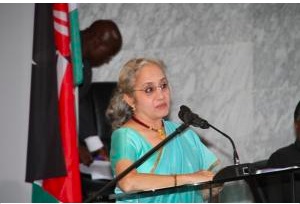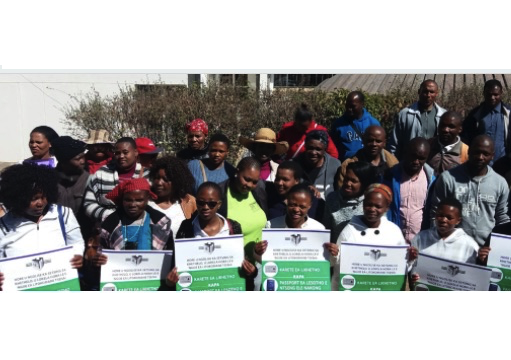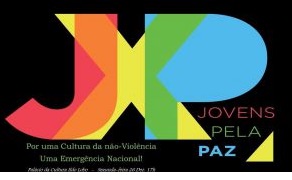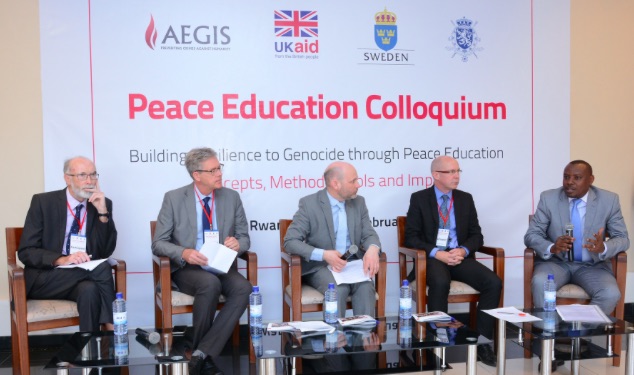FREE FLOW OF INFORMATION
A survey by CPNN
The following 81 events in 29 African countries were listed in “Google News” during the week of September 21-28 under the key words “International day of peace” and “Journée internationale de la paix.” This also includes some events listed on the websites of the Global Feast for Peace, and event map for the International Day of Peace. It is likely that there were articles in other local languages that are not listed here.
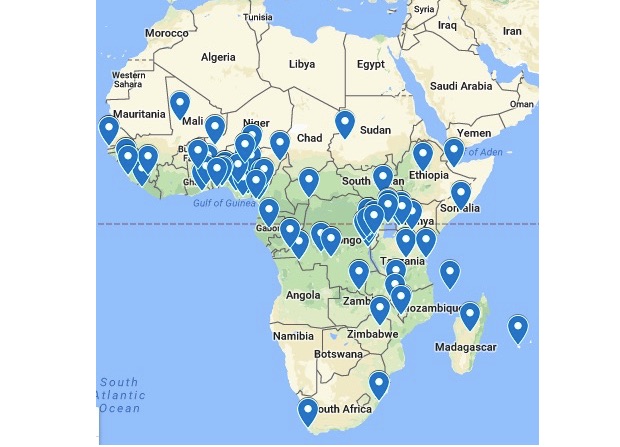
(Click on image to enlarge)
Here are excerpts from the articles.
GOMA, DEMOCRATIC REPUBLIC OF CONGO: Our friends in Goma celebrated Peace Day with a football match, participatory theatre show (pictured), live music and a march for peace, ending the day with some words of hope from the city’s mayor and a commitment to peace in DRC. Thanks to our partners Interpeace, ISSSS, Search for Common Ground and MSI for a wonderful day.
ADDIS ABABA, ETHIOPIA: The African Union (AU) in partnership with the United Nations Office to the African Union (UNOAU), Oxfam International, the International Committee of the Red Cross (ICRC) and the Institute for Peace and Security Studies (IPSS) organized a panel discussion on the theme, “Harnessing the Demographic Dividend: Meaningful Youth Inclusion in Peace-Building”, on the occasion of the International Day of Peace (Peace Day) 21 September 2017.
HO, GHANA: Rev. Monsignor Kornu was addressing a peace forum between the Nkonyas and Alavanyos in Ho to mark the International Day of Peace celebrations, which was on the theme: Together for Peace, Respect, Dignity and Safety for all.
NAIROBI, KENYA: The Eastern Africa Standby Force joined the rest of the world in celebrating the International Day of Peace on Thursday, 21st September 2017 in Karen, Nairobi. The day’s events started with the traditional Peace Walk which was led by the Kenya Army Band along the streets of Karen up to St. Nicholas Children’s Home; a home for orphaned children dedicated to giving these young people a fair chance and hope for the future.
LIBERIA : Peace Walk and Youth Peace Talk organized by Messengers of Peace-Liberia Inc (MOP) in collaboration with United Nations Mission in Liberia with support from UNDP and UN Peacebuilding Fund at the launch of the “Enhancing Youth Participation in the 2017 Legislative and Presidential Electoral Process,” and the commemoration of the International Day of Peace. . . . . It was gratifying to be graced by representatives from UNDP, UNMIL, UNFPA, UN Women, ECOWAS, Ministries of Youths & Sports, Justice, Information, Culture Affairs & Tourism, Rotary Club of Monrovia, National Civil Society Council and the media. Over six hundred students from thirty schools in Montserrado, Bomi, Bong and Margibi counties attended and listened keenly to the peace talk among members of the political parties.
BLANTYRE, MALAWI : People in Blantyre on Friday 22nd September 2017 joined their friends across the world to commemorate this year’s global International Day of Peace which was organised by the People’s Federation for National Peace and Development (PEFENAP). . . . peaceful processions which started from Old Town Hall, via Queen Elizabeth Central Hospital (QECH) to Blantyre Chichiri Shopping Mall and back to the Old Town Hall.
NIAMEY, NIGER : Our country, like the international community, celebrated today, 21 September, the International Day of Peace. Under the patronage of SEM Birigi Refinei, Prime Minister, head of government, the activities that took place in the course of this day were held this morning at the martial Arts Academy in Niamey.
ABUJA, NIGERIA : Nigerian youths across the 36 states of the federation and the Federal Capital Territory, congregated in Abuja, where the unity and peaceful coexistence among the Nigeria people was unequivocally addressed. The event, which had the theme ‘Together for Peace: Respect, safety and dignity for all’, was organised at the instance of the Peace Corps of Nigeria, under the leadership of Dr Dickson Akoh.
IKORODU, NIGERIA : As the world celebrate the International Day of Peace, a Non-governmental organisation, African Democratic Development Initiative, religious leaders and stakeholders in Ikorodu Lagos State have advocated for a society that is all inconclusive and violence free. The celebration was held, today Friday at the Ikorodu Local Government Secretariat.
LAGOS, NIGERIA : Governor Akinwunmi Ambode of Lagos State has acknowledged the role of citizens’ mediation in the promotion of peaceful co-exientence in the State, assuring that his administration would establish more centres in all the nooks and crannies of the State. . . . Ambode spoke at the celebration of the United Nations International Day of Peace at Alausa, Ikeja, Lagos.
KIGALI, RWANDA : To mark the day, over 400 Rwandan youth from across the country convened at Parliamentary Buildings in Kimihurura, Kigali to deliberate on different interventions of promoting values of respect towards more peaceful families. The National Unity and Reconciliation Commission (NURC) together with its partners aim to enhance citizens’ capacity to analyse the root causes of conflicts, facilitate dialogue, and appreciate diversity to ensure sustainable peace and development.
FREETOWN, SIERRA LEONE : The Day was commemorated at the Saint Antony Hall on Skye Street, Brookfieds, Freetown with several state and non-state actors deliberating on the need for peace, credible, free and fair elections in 2018.
CAPETOWN, SOUTH AFRICA : Residents and foreign nationals commemorated the International Day of Peace by launching an organisation that aims to promote harmony between them. The Association for Refugee Communities and Organisations in South Africa (ARCOSA) was launched last Thursday at the Blue Hall, in Site C, Khayelitsha. The launch was done in partnership with Cape Town Refugee Centre (CTRC) and Peace Builders Team.
DURBAN, SOUTH AFRICA : From 19-21 September 2017, ACCORD conducted a training for political officers working in the African Union Situation room in the Conflict Early Warning Systems (CEWS) which was held in Durban, South Africa.
HARARE, ZIMBABWE : A dialogue forum was held today at the UN Information Centre in Harare to celebrate the International Day of Peace.
KAMPALA, UGANDA : To celebrate the International Day of Peace, SOUTH SUDANESE STUDENTS studying at universities in Uganda are embracing their country’s cultural diversity to foster peace rather than focusing on tribal differences that have torn apart South Sudan in a nearly four-year-long conflict. The South Sudanese Students’ Union in Uganda organized a festival in Kampala as part of a series of events marking the United Nation’s International Day of Peace on September 21, whose theme this year is: “Together for Peace: Respect, Safety and Dignity for All.” Organizers said the event brought together South Sudanese communities and students in Uganda who have been divided along tribal and political lines.
CAPE VERDE : Under the motto “Together for Peace: Respect, Dignity and Security for All” is celebrated on September 21, World Peace Day. The Cape Verde National Commission for UNESCO, in partnership with the Ministry of Family and Social Inclusion, through the General Directorate of Immigration, will celebrate the day on Thursday, at the Manuel Lopes Secondary School in Calabaceira, starting at 09h. The event is attended by the Minister of Family and Social Inclusion, Maritza Rosabal. (translated by CPNN from the Portuguese original)
(Survey continued in the right column)
Question for this article
What has happened this year (2017) for the International Day of Peace?
(Survey continued from the left column)
(Note: the following events are translated by CPNN from the original French)
COTONOU, BENIN : “Peace is a matter for all, without discrimination of region and religion”. This is the message yesterday to the people of Cotonou by the Scouts on the occasion of the International Day of Peace. Organized by the Agro-Mechanical Center in Ouidah (Camo), these events, which took place at the Placodji Public Elementary School, were massively attended by pupils, teachers and parents. There were also the Scouts of the University Districts of the Injeps of Porto-Novo and Lokossa and those of the districts Notre Dame and Monsignor Isidore de Souza of Cotonou.
BURUNDI, RWANDA AND DEMOCRATIC REPUBLIC OF THE CONGO : On the occasion of the International Day of Peace celebrated on 21 September, 1,500 young people from Rwanda, Burundi and the DRC met in Goma to discuss peace. They participated in workshops on peace and gender and a charity concert.
BANGUI, CENTRAL AFRICAN REPUBLIC : Among the activities planned in Bangui, this Thursday, an official ceremony will be held at the Omnisports Stadium in Bangui, in the presence of the national authorities and the leadership of MINUSCA, followed by a photo exhibition at UNMIS headquarters in Bangui. . . .The International Day of Peace will also see a gathering of solidarity with the returnees, returnees and refugees from Bangui around the Abel Goumba roundabout. An activity organized with the Women’s Network of the MINUSCA Police in partnership with the Forces of Internal Security (FSI). A peace caravan initiated by the National Youth Council (CNJ) will travel through all the boroughs of the capital followed by the final of the Peace Tournament organized by the Bangui Football League.
COMORES : Like the other countries of the world, the Comoros celebrated, yesterday Thursday 21 September, the International Day of Peace. The ceremony took place at the council of the island of Ngazidja, in the presence of the political, military and religious authorities of the country. It was sponsored by the Salam association, an NGO working for the consolidation and maintenance of peace.
KANANGA, DEMOCRATIC REPUBLIC OF THE CONGO : About 500 people gathered at Independence Square in Kananga to commune and commit to Peace, a theme chosen by MONUSCO to celebrate the International Day of Peace. One year after the beginning of violence and repression in the region, the celebration of the International Day of Peace is of particular importance in Kananga.
KASAI, DEMOCRATIC REPUBLIC OF THE CONGO : For four days, the forum on peace in the Great Kasai was held in Kananga, capital of the Central Kasai. It was closed by a reconciliation ceremony, followed by rejoicing. Despite this, we must admit that questions remain unanswered.
LINGWALA, DEMOCRATIC REPUBLIC OF THE CONGO : Inspired by the principles advocated by Unesco, namely peace and the quality of education, the kindergarten children of the Academic Complex ACADEMIA celebrated yesterday Thursday with enthusiasm the International Day of Peace . . . Their performance of the song “We Advocate Peace” was highly applauded by the representative of the parents’ committee and the teaching staff at the headquarters of this private school, associated with Unesco.
GABON : Under the label of UNESCO, 103 Gabonese NGOs are fighting for peace as the women of other African countries already do. In this spirit, the Association A ‘Soif, whose founder is none other than Victoire Lasseni Duboz, celebrated the International Day of Peace. . . . Before a rich audience of all nationalities and representatives of UNESCO, the patroness of A’SOIF highlighted the different missions that this association is focused on and presented the plans for a national network of women for peace. “Through this network, 103 women’s NGOs unite to be apostles of peace in Gabon, while placing emphasis on poverty and unemployment which are real factors for the destitution of peace in a state”, hammered Francine Meviane, General Secretary of the National Network of Women for Peace. This UNESCO initiative is already established in several African countries with a clear ambition to create a pan-African network of women for peace.
CONAKRY, GUINEA : On the occasion of the celebration of the International Day of Peace . . . it was before a heterogeneous audience of Guinean and Senegalese writers, artists and other actors of civil society that the ambassador of peace Elhadj Djériba DIABY addressed the audience in a language full of humility and wisdom . ” The peace ! The peace ! Growing peace, without it, there is no development. I am deeply touched by this day because it marks a very important turning point in my life as a peace ambassador not only in Guinea but also throughout Africa. . . . As for the President of the Writers’ Association of Guinea, he also made his messages to the public in order to build a Guinea in peace : “The writer is a shepherd, a lighthouse that can put gunpowder or which can extinguish the fire by his pen. His works must therefore unify, educate, sensitize and inform and at the other end, peace is the central link for all human activities, which is essential to humans in their evolutionary process. So the book helps to understand the importance of peace, freedom and the consequences of war. It would then be opportune to say that this day must call on the young people to invest themselves in the reading to better understand the importance of peace. . . . The day not only allowed the youth to touch the hands of the recommendations of these men of peace but also to enroll in an impulse promoting the behaviors of respect for others. It was also an opportunity for exchanges between the youth and the writers.
LA REUNION : Eric Magamootoo, former President of the Chamber of Commerce and Industry, is visiting Réunion and will be hosting a conference on the theme of Peace and Living Together in Reunion on Thursday September 21st in St Pierre. At the same time, there will be a symbolic olive-tree planting by the Mayor of Saint Pierre and Mr Magamootoo today at the Edith Piaf school in Saint Pierre and there will also be a conference “L’olivier et la paix” at the media library Antoine Louis Roussin in St Benoît
MADAGASCAR : To mark the celebration of the International Day of Peace on September 21, 2017, the Regional Tourist Office of Analamanga ORTANA and the Rotary Club Antananarivo Ainga will organize a distribution of honey for all in the Garden of Antaninarenina this Thursday, September 21, 2017 starting at 09:00. . . . In the Malagasy tradition, honey is important and ubiquitous, whether to celebrate, welcome or bless, honey is definitely anchored in Malagasy culture.
MALI : As part of the celebration of the International Day of Peace, the Association of Journalists for Peace and Non-Violence (AJPV), in partnership with GENOVICO, organized a conference-debate on the theme: to have a more professional press in Mali. It was moderated by Sadou Abdoulaye Yattara, Journalist, Expert in Communication, Advocacy and Media Education, at the Djoliba Center, on Friday, 22 September 2017.
TOGO : On September 18, 2017, the Regional Office for West Africa of the International Organization of la Francophonie hosted some 30 young people for an awareness-raising and training workshop on the values and tools of animation of the initiative “Libres ensemble.” Initiated by the Association les Messagers de la Jarre de Paix (AMJP), the workshop is organized as a prelude to the International Day of Peace.
In addition to the above events, there are a number of events in Africa listed on the event map for the International Day of Peace, including in SONDU, KENYA, as well as ENTEBBE, UGANDA and TAMALE, GHANA and the Buhera rural district of ZIMBABWE.
Many cities and communities are members of the International Peace Cities network and the following are listed on the Global Feast Map as celebrating a feast to mark the International Day of Peace:
DEMOCRATIC REPUBLIC OF THE CONGO: Bukavu, Fizi, Lubumbashi, Goma, Uvira, North and South Kivu, Kasongo-Lunda.
NIGERIA: Warrake, Kano, Kaduna, Abuja, Uyo, Benin City, Warri, Port Harcourt, Lafia, Sukkur, Ibadan
KENYA: Nairobi, Nakuru, Oyugis, Ringa, Homa Bay, Ogamo, Kakamega
MALAWI: Mzuzu, Lilongwe, Chikwawa
SOUTH SUDAN: Nyala (Darfur), Juba
BURUNDI: Bujumbura, Gitega, Rohero, Ngozi
UGANDA: Kampala, Wakiso, Luweero, Wobulezi, Kabale
RWANDA: Kibuye, Kabare
CAMEROON: Douala, Bameneda, Kumbo, Buea
GHANA: Accra
LIBERIA: Monrovia, Voinjama,Lofa
SOMALIA: Hargeisa, Mogadishu
SIERRA LEONE : Freetown
TANZANIA : Zanzibar City, Dodoma
GUINEA : Conakry
GAMBIA : Banjul
